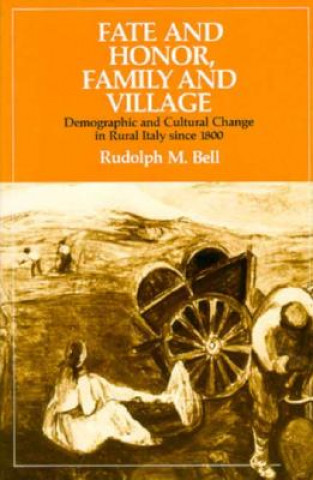
Kód: 04542469
Fate and Honour, Family and Village
Autor Rudolph M. Bell
The Italian peasantry has often been described as tragic, backward, hopeless, downtrodden, static, and passive. In "Fate and Honor, Family and Village," Rudolph Bell argues against the characterizationmore by reconstructing the co ... celý popis
- Jazyk:
 Angličtina
Angličtina - Vazba: Pevná
- Počet stran: 286
Nakladatelství: University of Chicago Press, 1979
- Více informací o knize

2093 Kč

Skladem u dodavatele v malém množství
Odesíláme za 12-17 dnů
Potřebujete více kusů?Máte-li zájem o více kusů, prověřte, prosím, nejprve dostupnost titulu na naši zákaznické podpoře.
Přidat mezi přání
Mohlo by se vám také líbit
-

Japanese/Korean Linguistics
2463 Kč -

Student Writing in the Quantitative Disciplines - A Guide for College Faculty
1203 Kč -

Crewel Twists
488 Kč -

Inventing the Public Enemy
1124 Kč -

Escaping Bondage
1841 Kč -

Enhancing U.S. Leadership at the United Nations
508 Kč -

Gay Signatures
1579 Kč
Darujte tuto knihu ještě dnes
- Objednejte knihu a zvolte Zaslat jako dárek.
- Obratem obdržíte darovací poukaz na knihu, který můžete ihned předat obdarovanému.
- Knihu zašleme na adresu obdarovaného, o nic se nestaráte.
Více informací o knize Fate and Honour, Family and Village
Nákupem získáte 209 bodů
 Anotace knihy
Anotace knihy
The Italian peasantry has often been described as tragic, backward, hopeless, downtrodden, static, and passive. In "Fate and Honor, Family and Village," Rudolph Bell argues against the characterizationmore by reconstructing the complete demographic history of four country villages since 1800. He analyzes births, marriages, and deaths in terms of four concepts that capture mroe accurately and sympathetically the essence of the Italian peasant life: "fortuna "(fate), "onore" (honor, dignity), "famiglia" (family), and "campanilismo" (village). "Fortuna "is the cultural wellspring of Italian peasant society, the world view from which all social life flows. The concept of "fortuna "does not refer to philosophical questions, predestination, or value judgments. Rather, fortuna is the sum total of all explanations of outcomes perceived to be beyond human control. Thus, in Bell's view, high mortality does not lead peasants to a resigned acceptance of their fate; instead, they rely on honor, reciprocal exchanges of favors, and marriage to forge new links in their familial and social networks. With thorough documentation in graphs and tables, the author evaluates peasant reactions to time, work, family, space, migration, and protest to portray rural Italians as active, flexible, and shrewd, participating fully in shaping their destinies. Bell asserts that the real problem of the Mezzogiorno is not one of resistance to technology, of high birth rates, or even of illiteracy. It is one of solving technical questions in ways that foster dependency. The historical and sociological practice of treating peasant culture as backward, secondary, and circumscribed only encourages disruption and ultimately blocks the road to economic and political justice in a postmodern world.
 Parametry knihy
Parametry knihy
Zařazení knihy Knihy v angličtině Humanities History Regional & national history
2093 Kč
- Plný název: Fate and Honour, Family and Village
- Podnázev: Demographic and Cultural Change in Rural Italy Since 1800
- Autor: Rudolph M. Bell
- Jazyk:
 Angličtina
Angličtina - Vazba: Pevná
- Počet stran: 286
- EAN: 9780226042084
- ID: 04542469
- Nakladatelství: University of Chicago Press
- Hmotnost: 509 g
- Rozměry: 250 × 200 × 21 mm
- Datum vydání: 01. December 1979
Oblíbené z jiného soudku
-

Hundred Years' War on Palestine
338 Kč -

Ethnic Cleansing of Palestine
357 Kč -

History of Japan
405 Kč -

Ten Myths About Israel
336 Kč -

Strange Death of Europe
410 Kč -

Decline and Fall of the Roman Empire
130 Kč -

Secret History
320 Kč -

God's Playground A History of Poland
1700 Kč -

Mayflower
385 Kč -

How to be a Victorian
357 Kč -

Plantagenets
331 Kč -

General's Son
428 Kč -

Iran: A Very Short Introduction
225 Kč -

Temples of Karnak
3800 Kč -

Twenty Years A-Growing
249 Kč -

Cuneiform
276 Kč -

History of Witchcraft in England from 1558 to 1718
453 Kč -

China in Africa
894 Kč -

Islandman
249 Kč -

Bohemian Paris
414 Kč -

Lancaster And York
490 Kč -

Alexiad
423 Kč -

Inside Hitler's Greece
513 Kč -

Modern France: A Very Short Introduction
233 Kč -

Diana: Her True Story - In Her Own Words
306 Kč -

The Fourth Turning
441 Kč -

The Oxford History of Ancient Egypt
383 Kč -

Churchill: The Power of Words
410 Kč -

Palestine
534 Kč -

Korean History in Maps
706 Kč -

Great Gatsby (Wisehouse Classics Edition)
405 Kč -

Viking Way
1144 Kč -

The Thirteenth Tribe
308 Kč -

My Promised Land
358 Kč -

Vanished Kingdoms
514 Kč -

Age Of Revolution
410 Kč -

Life and Death of Anne Boleyn
624 Kč -

Coming of the Third Reich
464 Kč -

Children of Ash and Elm
464 Kč -

Europe Between the Oceans
798 Kč -

Socialism Betrayed
475 Kč -

303 Squadron
452 Kč -

Ancient Celts, Second Edition
623 Kč -

Dancing in the Glory of Monsters
395 Kč -

Battle of Britain: Luftwaffe Blitz (Images of War)
606 Kč -

Age of Confucian Rule
851 Kč -

Beyond Band of Brothers
410 Kč -

Benjamin Franklin
410 Kč -

On China
462 Kč
Osobní odběr Praha, Brno a 12903 dalších
Copyright ©2008-24 nejlevnejsi-knihy.cz Všechna práva vyhrazenaSoukromíCookies


 Vrácení do měsíce
Vrácení do měsíce 571 999 099 (8-15.30h)
571 999 099 (8-15.30h)